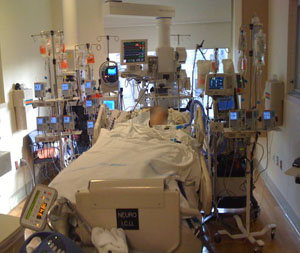

MedFriendly®


Neurosurgery Intensive Care Unit
A Neurosurgery Intensive Care Unit (NSICU) is an area of
a hospital for patients who require neurosurgery (surgery
of the brain or spine) and who require close monitoring
and constant, complicated, detailed nursing and medical
care. In other words, the care is extreme or intensive,
hence the name Intensive Care Unit. Patients are kept in
the NSICU for as long as is medically necessary. The
types of patients typically cared for in an NSICU are
those who suffered brain and/or spinal cord damage due
to trauma, stroke (burst artery or a blockage of an artery),
tumor, or hemorrhaging (bleeding).
FEATURED BOOK: Handbook of Neurosurgery
The NSICU consists of highly specialized, complicated devices and equipment for
monitoring patients and for reviving them from apparent death or unconsciousness. An
example of such monitoring equipment is an intracranial pressure monitor, which
measures the amount of pressure within the brain from swelling. Excessive brain swelling
may be treated with diuretic medications (such as Mannitol) that help remove fluid from
the body. In the worst case scenario, brain surgery may be needed to remove the excess
fluid and decrease pressure on the brain.
An NSICU has staff such as nurses and doctors that are educated and trained to provide
the specific type of health care needed to these types of patients. A Neurosurgery
Intensive Care Unit is also known as a Neuroscience Intensive Care Unit and a Neuro-
Intensive Care Unit.
"Where Medical Information is Easy to Understand"™















